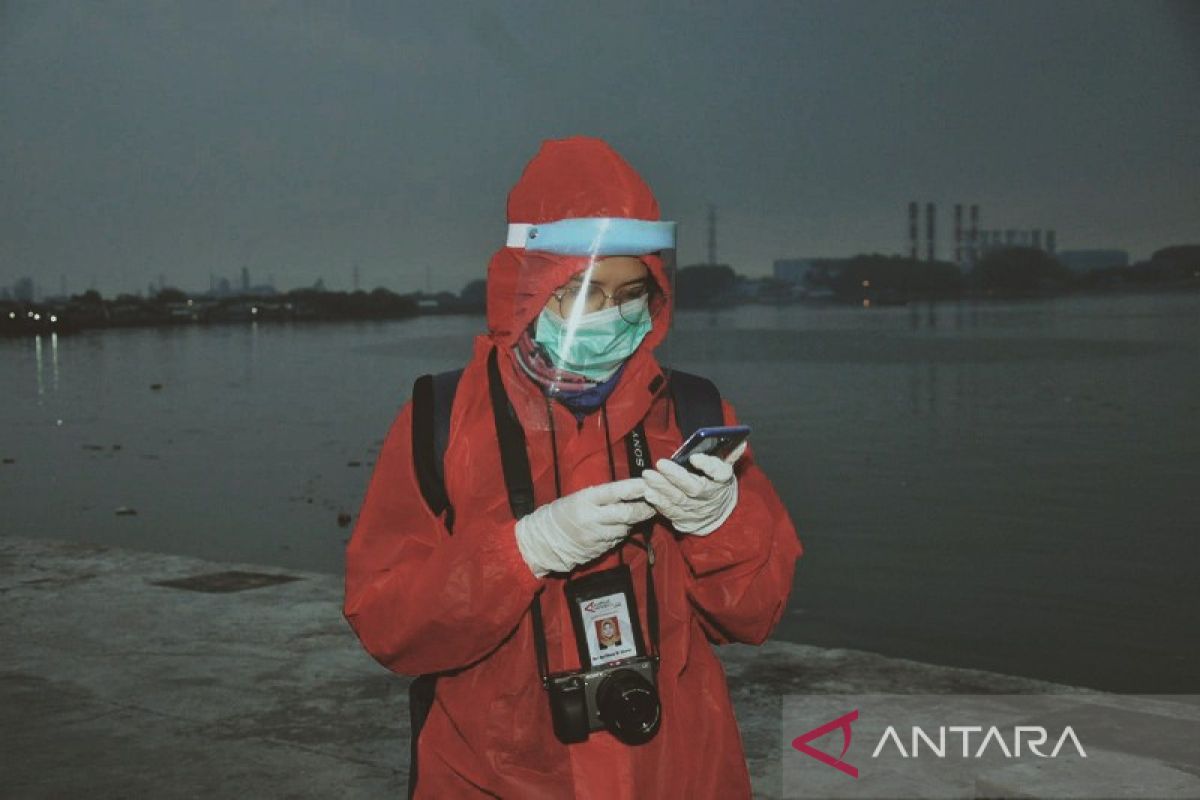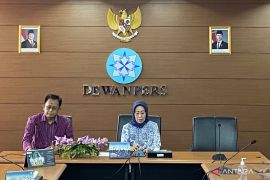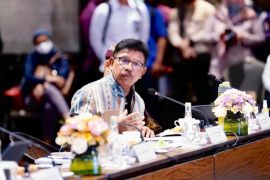Never be afraid to do your best just because you are a womanMedan (ANTARA) - The global community, including Indonesia, has been co-existing with COVID-19 for over two years, and amid the looming threat of the Delta variant, Indonesia faces yet another danger of the Omicron variant, with ever-increasing cases.
It is beyond mere claims. There is data to back it up, as was announced by the health minister. He revealed that as of January 31, the number of national confirmed cases of COVID-19 had increased by 10,185, thereby bringing the total to 4,353,370 cases.
Of the total 4,353,370 cases of COVID-19 in Indonesia, 4,140,454 patients had made a recovery, while 144,320 people had passed away.
Health Minister Budi Gunadi Sadikin estimated that the number of COVID-19 cases would continue to increase and even peak during the period from February to March 2022. The largest contributor has apparently been the Omicron variant that is currently spreading in several provinces in Indonesia.
The Omicron variant of COVID-19 is viewed as having a rapid transmission rate, up to five folds higher as compared to its earlier counterparts.
Since the announcement of the first case of the Omicron variant in Indonesia on December 16, 2021, the number of patients currently infected with the Omicron strain has reached 2,507.
Related news: Sorghum, West Kalimantan's potential alternative to wheat
This figure rose 89.9 percent within a week, an increase by 351 cases as compared to the previous day, when some 2,156 cases were reported. Of the 2,507 Omicron patients, 765 had recovered as of Sunday, January 30.
In the current situation of the COVID-19 pandemic, the development of digital-based information is the dire need of the hour. The public needs credible and reliable information to keep abreast of the developments of COVID-19 pandemic and its impacts. Thus, people will gain a better understanding of proper protection for themselves, their families, and the environment.
In this case, the press, as an agency that creates and distributes information, plays a critical role as a source of information for the public.
However, the current situation has severely curbed the movement of journalists. All of a sudden, every press conference is being conducted online. Should there be an event that requires face-to-face meeting, one must wear personal protective equipment and follow health protocols in a strict, disciplined manner. However, maintaining distance during a doorstop interview is replete with challenges.
Even in the midst of danger, journalists, including female staff members, are still required to complete their tasks to deliver information directly from the source.
This experience is felt by many, including a female reporter for the Indonesian News Agency ANTARA, Evalisa Siregar. Her role, as a mother of one and a staff member, did not limit her enthusiasm to attempt to deliver accurate and actual information to the public.
She has extensive experience in journalism after having dabbled in the field for nearly 33 years. Reporting on topics, such as demonstrations, natural disasters, political issues, economic matters, and legal affairs, as well as the COVID-19 pandemic, are part of Siregar's expertise.
Related news: Baduy women farm for tradition sake, loyalty
Despite all that, there is a weight she must carry. Siregar deemed the pandemic had made it tougher for her to work as a journalist. Getting firsthand data and facts is an absolute must, even when the threat of coronavirus is constantly lurking.
Earlier, she was brimming with energy and spirit whenever she ventured onto the field to report events. Now, Siregar is daunted by fears of getting infected by COVID-19 and then bringing the virus home. The mental pressure gets worse when fellow journalists are exposed to COVID-19.
"I am getting more and more scared and panicky when a professional colleague passed away from COVID-19," Siregar remarked.
What complicates matters is that journalists often move from one place to another during their duties, thereby making it difficult for them to avoid the risk of being infected. On top of that, some cases of COVID-19 are difficult to discern with the naked eye, as there are several asymptomatic people. It makes everything even harder.
Siregar has applied some methods to avoid contracting COVID-19 despite her tendency to travel often. Some of these approaches include equipping herself with some items, such as hand sanitizer, masks, and also taking vitamins.
Undoubtedly, the work pattern during the pandemic overwhelms her. Why? Often she and her colleagues are required to undergo COVID-19 tests when they are going for field reporting.
Moreover, her workplace imposes several regulations for journalists, who conducted field reporting, such as limiting duration of journalists to be in the area for no more than an hour; requiring journalists to wear PPE when in the red zone where the spread of the virus is intense; showering after field reporting and sterilizing recording equipment before and after field reporting, as well as some other rules.
Related news: City tour along historical buildings in Jember
Siregar believed that those plethora of rules were made for the greater good of herself, family, and her peers.
According to Siregar, journalists, women in particular, play many roles much more than usual during the pandemic. Apart from thinking about how to become a breadwinner, they must also function as a teacher, as the responsibility has been partially shifted from school to home.
However, grief does not always hinder progress. Such was Siregar's principle in conducting her professional duties as provider of accurate and neutral information to the public.
"The point is to be smart in managing the family's economy and healthy lifestyle, accompanying children to study at home, and to keep working professionally," she remarked.
Hoaxes
Farida Noris, a journalist for CNN Indonesia, goes through a similar predicament. Although she is relatively young, it does not constrain her willingness to present news with educational values for the public.
At the onset of the pandemic, it was hard for Noris, since not much research on COVID-19 had been conducted, thereby deemed by many as terrifying. While most people opted to stay homebound out of fear of getting infected, Noris had to overcome her fear and come out of her house to work. The entire situation stressed her out.
Fear cannot be ignored during field reporting in areas where COVID-19 transmission is rampant, such as hospitals, isolation areas, and crowded places.
"But like it or not, it has to be done because this is my professional responsibility as a journalist," she remarked.
Noris opined that her gender did not limit her from creating the best journalistic products during the COVID-19 pandemic.
"Never be afraid to do your best just because you are a woman," she affirmed.
Since the start of the pandemic, people have consumed a lot of information, both validated and hoaxes. This condition is made worse owing to the extensive use of the internet.
The fear, coupled with misleading rumors, induce panic among members of the public. As a result, it has degraded public confidence in the government over the accuracy of circulated information.
Related news: Sigantang Sira Hill, "locomotive" of South Aceh tourism
It cannot be denied that scores of people fear getting vaccinated despite inoculation being one of the government's attempts to limit the transmission of COVID-19.
The journalists' presence is indispensable in dispelling misinformation among members of the public by seeking accurate data and facts from relevant sources in order to ward off the infodemic.
Not only that, journalists must also be constructive in processing their data, so that they are able to provide a valid and trustworthy perspective for everyone.
Positive and educational news is expected to enlighten the public to work together to prevent the transmission of COVID-19 by continuing to follow health protocols and adhering to government regulations, all for the sake of a greater good, so that the COVID-19 pandemic ends soon.
One of the positive impacts of credible news is the increasing number of citizens, who are willing and keen to be vaccinated.
Based on data from the COVID-19 Task Force, as per January 31, 2022, some 184,680,997 Indonesians had been vaccinated.
This figure was recorded after additional 123,282 people had received the first dose of COVID-19 vaccination. Meanwhile, 129,028,074 people had received the full dose of COVID-19 vaccination.
As many as 4,221,642 people have received the third dose of vaccination, after an additional 17,002 people had been administered the vaccine.
The government aims to inoculate 208,265,720 citizens in a bid to build immunity against the coronavirus.
Related news: Government reopens coal exports after month-long ban
Related news: Indonesia urges Myanmar military to promptly implement ASEAN's 5PC
Editor: Fardah Assegaf
Copyright © ANTARA 2022











